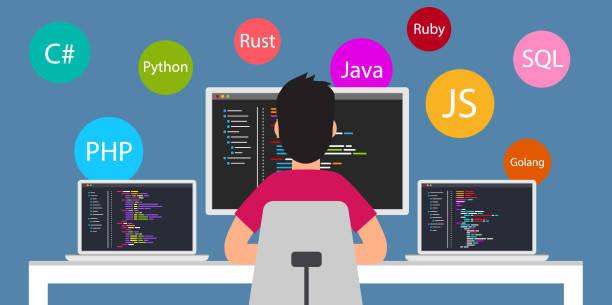A backend developer is someone who works on the backend, or server, of websites and applications. Creating the necessary backend infrastructure, such as a database, API, and server-side logic, falls under this category. They collaborate closely with front-end programmers to fix bugs and add features that enhance the app’s usability.
The primary responsibility of a backend developer is to design and implement a system that is secure, dependable, and able to scale to meet the demands of a large user base. Web applications that are reliable and efficient are developed using languages and frameworks such as Node.js, Python, Ruby, and PHP.
Responsibilities Of Backend Developers
Depending on the nature of the project, the company, and the technology stack in use, a backend developer’s duties may shift. However, a backend developer often is responsible for the following tasks:
- Web application backend developers are in charge of developing, deploying, and maintaining the apps’ backends on servers. Building a database, application programming interface (API), and server-side logic requires the use of many programming languages, frameworks, and tools.
- To respond quickly to user requests while keeping server load to a minimum, backend developers must craft code that is both efficient and scalable. Code needs to be optimized for speed, memory consumption, and scalability.
- Developers working on the backend must be adept at debugging and troubleshooting problems in the server-side code. The application’s smooth operation depends on their ability to examine logs, employ debugging tools, and collaborate with other developers.
- Designing and maintaining the web app’s database falls under the purview of the backend developers. Developing the data model, constructing queries, enhancing database efficiency, and protecting the confidentiality and availability of data are all part of this process.
- Backend developers are responsible for the creation of application programming interfaces (APIs) and their integration into the application. The web app’s functionality can be improved by incorporating APIs and services from external sources.
- Backend programmers need to communicate with front-end programmers, designers, project managers, and other stakeholders to learn about their needs, offer advice on how to meet those needs technically, and work together to produce high-quality software.
- Keeping abreast of technological developments is essential for success in the field, and this is especially true for backend engineers. As part of this process, you should participate in relevant conferences, study relevant papers, and play with with emerging technologies and frameworks.
Required Skills of a Backend Developer
Different projects, industries, and technology stacks will call for different sets of abilities from a backend developer. A backend developer may need expertise in a wide variety of fields, however the following are some of the most common:
- A backend developer’s expertise should extend to at least one server-side programming language and one or more frameworks, such as Node.js, Python, Ruby on Rails, PHP, or Java. Using these languages and frameworks effectively, they should be able to produce code that is efficient, scalable, and safe.
- A backend developer’s skillset should extend to database design and management tasks such developing database schemas and queries, tuning database performance, and protecting data. The ability to work with relational and non-relational databases like MySQL, MongoDB, and PostgreSQL is required.
- Backend developers are responsible for the design, implementation, and integration of application programming interfaces (APIs), which allow the client and server sides of an application to communicate with one another. They also need to be experts in incorporating external APIs and services to expand the capabilities of the web app.
- A backend developer’s knowledge of web protocols like HTTP, HTTPS, REST, and SOAP is essential for the creation and upkeep of any web application.
- Strong debugging and troubleshooting skills are essential for a backend developer, as this is how problems with the server-side code are found and fixed. They should be able to interact with other developers to troubleshoot and keep the app running well by analyzing logs and employing debugging tools.
- To make sure the web app is safe and can manage a big number of requests, a backend developer should be well-versed in security and scalability problems and know how to adopt best practices.
- A backend developer’s ability to communicate and collaborate with other developers, stakeholders, and clients is crucial to the success of any project. They need to be able to take in information about the project, process it technically, and work with others to produce high-quality code.
Qualifications and Training For a Backend Developer
Having a solid background in programming, computer science, and related subjects is usually required to become a successful backend developer. You can improve your chances of finding employment as a backend developer by acquiring the following skills and experiences:
- A bachelor’s degree in computer science, software engineering, or a related discipline is desirable. It’s not always essential, though; many accomplished backend engineers learned their craft through a combination of self-study and on-the-job training.
- Backend development requires a solid understanding of one or more programming languages. Python, Java, Ruby, and JavaScript are just a few of the languages utilized for back-end programming.
- Developers with experience on the back end should be well-versed in database systems like MySQL, MongoDB, and PostgreSQL. Both SQL and NoSQL database knowledge are required.
- Knowing a web framework such as Django, Flask, Ruby on Rails, or Express can allow you to create reliable backend software.
- The ability to work with APIs effectively is essential. You should have prior experience with API development and knowledge of RESTful API architecture principles.
- DevOps: It is becoming increasingly critical for backend engineers to be familiar with DevOps tools like Docker, Kubernetes, and Jenkins in order to successfully deploy and manage their applications.
- Soft skills: A successful backend engineer must have strong problem-solving, communication, and teamwork abilities. The ability to work well with others, express one’s thoughts clearly, and collaborate productively is crucial for producing high-quality software.
To start working as a back-end developer, you must first have in-depth knowledge of programming languages like Python and PHP. There are many online courses with certifications for you to choose from but we recommend you start with this one.
Meta Back-End Developer Professional Certificate
Average Annual Salary Back-end Developers- $82,326
Entry level (0-1 year)- $72,514
Early Career (1- 3 years)- $75,435
Mid-Career (4 -6 years)- $83,789
Experienced (7 -9 years)- $87,979
Job Outlook For Back-end Developers
The career outlook for web developers is favourable as more web development jobs are popping up. The U.S. BLS has predicted a 13% increase in the demand for web developers, including back-end developers by 2030.




